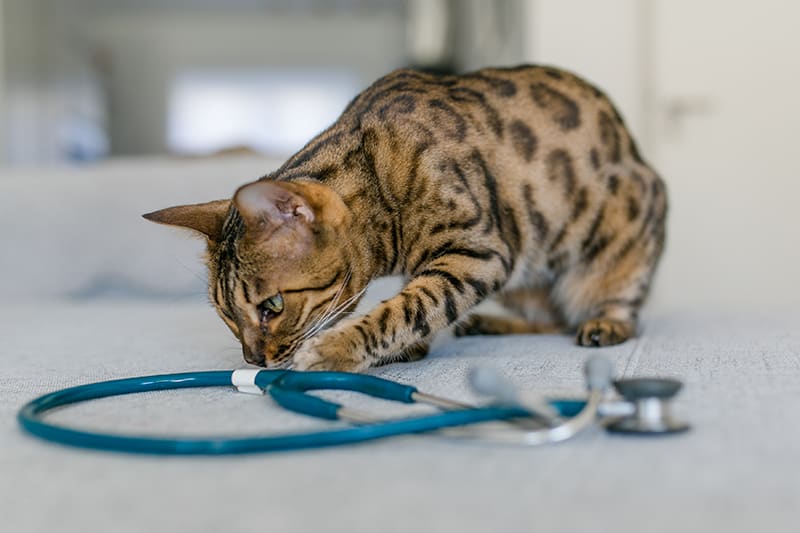It's pretty unpleasant to witness a cat dry heaving, but you may feel reassured to learn that in many cases dry heaving in cats is harmless. However, there are also some serious health concerns that can also lead to dry heaving. Below, our Bartlett vets share more about why your cat may be dry heaving.
Why Cats Dry Heave
While cat dry heaving may look and sound unpleasant, many of the reasons why your cat might dry heave are relatively minor.
However, it's important to note that there are also a number of more serious reasons why your pet may be dry heaving. The challenge is diagnosing whether your cat's dry heaving is simply the need to expel a hairball or whether there is a more serious underlying cause. Below are some of the most common causes of dry heaving in cats.
Furballs / Hairballs
A furball or hairball is the most common cause of dry heaving in healthy cats and can happen in both kittens and adult cats.
When your cat grooms themselves, tiny hook-like structures on their tongue catch loose and dead hair, which is then swallowed. The majority of this hair passes all the way through the digestive tract with no problems. But if some hair stays in the stomach, it can form a hairball. Usually, your cat will vomit the hairball to get rid of it.
If your kitty is having difficulties bringing up a furball or hairball it can lead to hacking, gagging, dry heaving or retching. In most cases your cat will vomit the hairball in a few tries however, furballs that are not expelled by your cat can lead to life-threatening blockages.
If your cat repeatedly dry heaves and begins showing any of the symptoms below, contact your vet right away.
- Loss of appetite
- Lack of usual energy
- Constipation
- Diarrhea
The symptoms above could indicate a serious intestinal blockage.
Feline Kidney Disease
Common in older cats, kidney disorders can lead to a number of symptoms including dry heaving, nausea and vomiting. Other symptoms associated with kidney disease in cats include
- Itchiness
- Depression
- Increased thirst
- Increased urination
- Weakness
- Pale gums
Gastroenteritis & Intestinal Inflamation
Gastroenteritis is an inflammation of the stomach or intestine that can lead to gagging, dry heaving, and vomiting in cats and kittens. In some cases, you may notice that your cat foams at the mouth while vomiting with an empty stomach.
If your cat is suffering from gastroenteritis you may notice that gagging and dry heaving occurs most often following a meal.
Gastroenteritis in cats can be caused by bacteria, viruses, parasites, new food, or a reaction to medications.
Diarrhea, reluctance to eat, lack of energy and depression are also signs of gastroenteritis in cats.
Heart Disease
Both acquired (caused by something) and congenital (by birth) heart disease is relatively common in cats.
As well as dry heaving, some feline heart conditions may also cause general weakness, breathing difficulty, wheezing, coughing, abdomen swelling, and abnormal heart rate.
If your cat is dry heaving and displaying any of the symptoms above contact your vet to schedule an examination for your kitty.
Liver disease
Your cat's liver is essential for storing vitamins and filtering toxins. Liver issues often occur due to an infection or toxins in the body.
Cat's experiencing liver issues may dry heave and show other symptoms such as yellowing of the eyes and skin, pale gums, increased thirst, lethargy, lack of appetite, weight loss, and distended abdomen.
Nauseous
Just like humans, cats can also feel nauseous. An upset stomach can occur due to overeating, eating spoiled food, increased stomach acidity. Nausea in cats typically isn't serious and will likely pass, however if you begin to notice other symptoms such as recurring vomiting or heaving, lack of energy, abdominal pain or fever it's time to head to the vet for an examination.
Foreign body in the stomach or throat
Cats - like dogs - will often swallow things they shouldn't. Ingesting foreign objects could lead to a blockage in their throat, esophagus, or intestine.
If your cat is dry heaving and no hairball comes out, is experiencing recurrent vomiting, refuses to eat, or has abdominal pain or swelling contact your vet right away.
A blockage or obstruction is a serious veterinary emergency that requires urgent care.
Note: The advice provided in this post is intended for informational purposes and does not constitute medical advice regarding pets. For an accurate diagnosis of your pet's condition, please make an appointment with your vet.
Are you concerned about your cat's dry heaving? Call our Bartlett vets today to book an appointment for your feline friend.

Looking for a vet in Memphis?
We're always accepting new patients, so contact our veterinary hospital today to book your pet's first appointment.Related Articles View All
Tips to Make Traveling With a Cat Easier
Planning a trip with your favorite feline friend? Today, we share tips to help make the journey an enjoyable experience for both you and your cat.
How to Treat Constipation in Cats
Constipation isn't just uncomfortable for your cat, it could be a sign of a serious health problem. What causes constipation in cats? What are the signs? Can it be treated at home? Read on to find out.
A Pet Parent's Guide to Gingivitis in Cats
Is your cat losing weight or refusing to eat? It could be a sign of dental health problems. One common dental issue in cats is an inflammation of the gums called gingivitis. In today's post, you will learn about the signs and how cat gingivitis can be treated.
Your Guide to Raising a Puppy & Kitten Together
Looking for a furry friend to welcome into your home? Maybe two fur babies would be even better? Our Bartlett vets explore the challenges and rewards of raising a puppy and kitten in the same household.
